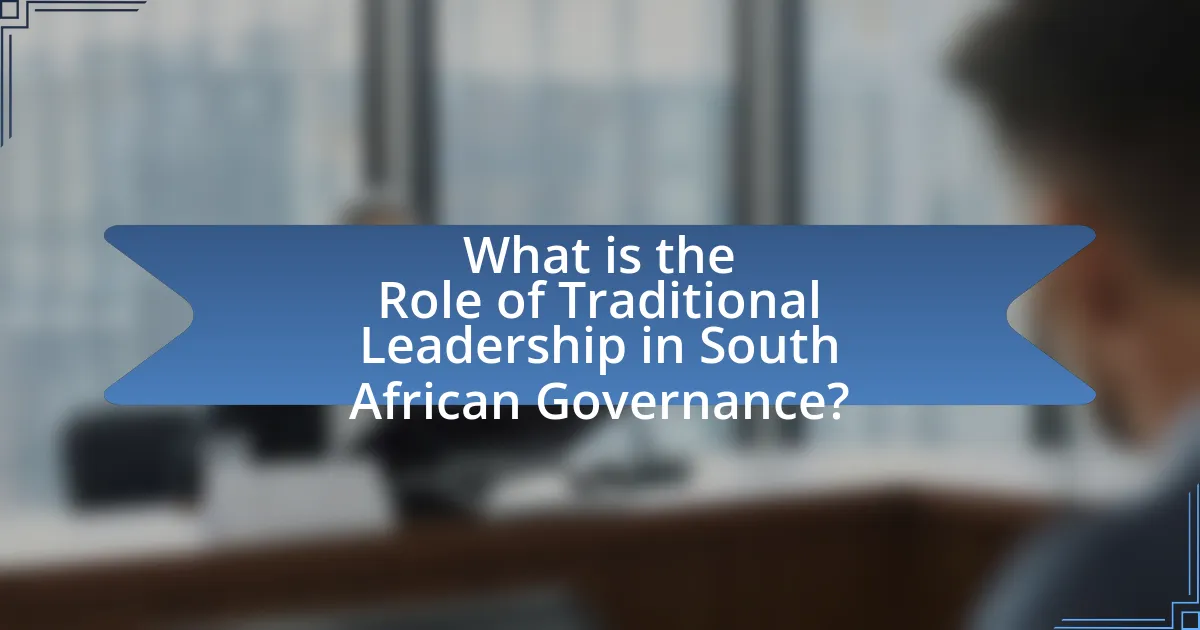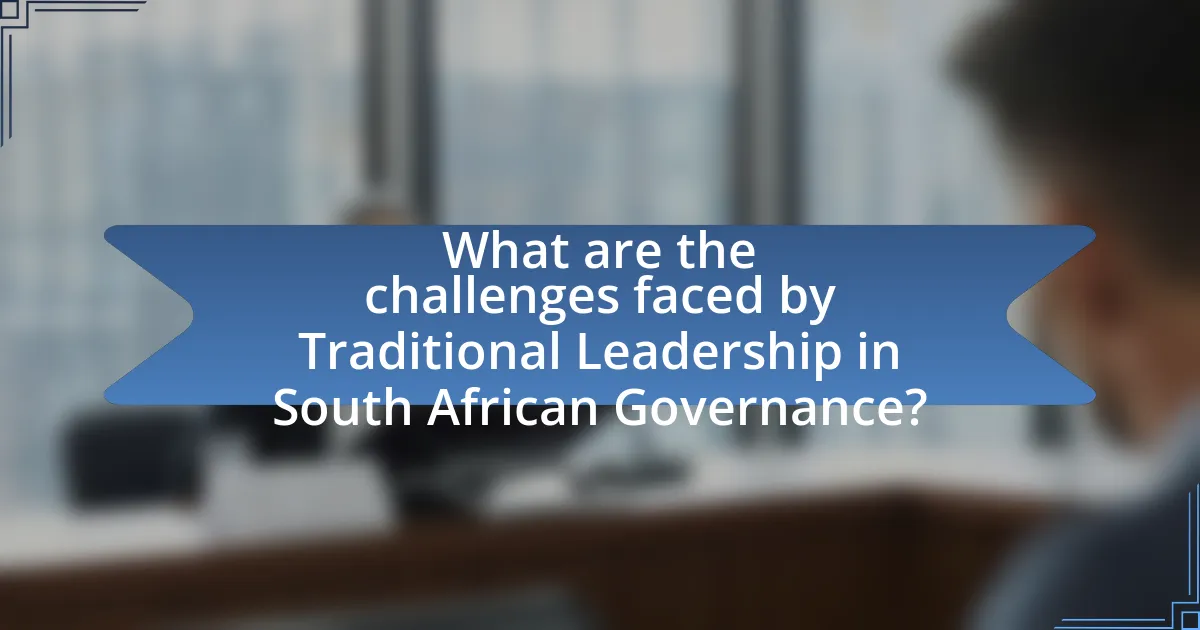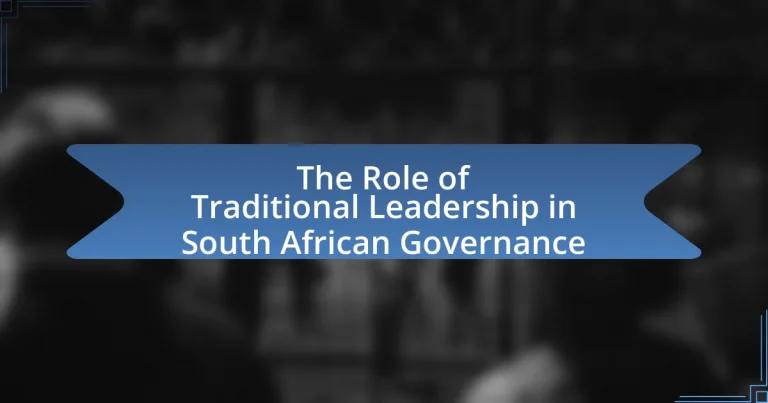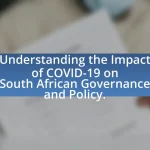Traditional leadership in South African governance serves as a vital connection between the state and local communities, particularly in rural areas. Recognized by the Constitution, traditional leaders influence community decision-making, conflict resolution, and the administration of customary law, thereby preserving cultural heritage and promoting social cohesion. The article explores the evolution of traditional leadership, its historical influences, key functions in governance, and the challenges it faces in the modern political landscape. It also examines the relationship between traditional and modern governance structures, highlighting the importance of collaboration and adaptation for traditional leaders to remain relevant in contemporary society.

What is the Role of Traditional Leadership in South African Governance?
Traditional leadership in South African governance serves as a crucial link between the state and local communities, facilitating cultural representation and social cohesion. Traditional leaders, recognized by the Constitution of South Africa, play a role in local governance structures, particularly in rural areas, where they influence community decision-making and conflict resolution. They are involved in the administration of customary law and the preservation of cultural heritage, which is essential for maintaining social order and identity among various ethnic groups. The Traditional Leadership and Governance Framework Act of 2009 further formalizes their role, ensuring that traditional leaders participate in local government processes, thereby enhancing democratic governance at the grassroots level.
How has traditional leadership evolved in South Africa?
Traditional leadership in South Africa has evolved from a system primarily based on hereditary authority and tribal structures to a more integrated role within the democratic governance framework. Historically, traditional leaders held significant power in their communities, serving as custodians of culture and local governance. However, post-apartheid reforms, particularly the Traditional Leadership and Governance Framework Act of 2003, have formalized the role of traditional leaders within the national governance system, allowing them to participate in local government while also recognizing their cultural significance. This evolution reflects a balancing act between preserving cultural heritage and adapting to modern democratic principles, as traditional leaders now often collaborate with elected officials to address community needs and development.
What historical factors influenced the development of traditional leadership?
Historical factors that influenced the development of traditional leadership include colonialism, the establishment of tribal structures, and the impact of apartheid policies. Colonialism disrupted existing governance systems, leading to the imposition of foreign rule and the reorganization of local leadership structures to fit colonial administrative needs. The establishment of tribal structures formalized the role of traditional leaders as intermediaries between colonial authorities and local communities, which further entrenched their power. Additionally, apartheid policies marginalized traditional leadership while simultaneously co-opting it to serve state interests, shaping the contemporary role of traditional leaders in South African governance. These historical contexts illustrate how traditional leadership evolved in response to external pressures and internal dynamics within South African society.
How do cultural practices shape traditional leadership roles?
Cultural practices significantly shape traditional leadership roles by defining the values, norms, and expectations that govern the behavior of leaders within a community. In South Africa, for instance, cultural practices such as respect for elders, communal decision-making, and rituals play a crucial role in legitimizing the authority of traditional leaders. These practices establish a framework within which leaders are expected to operate, reinforcing their roles as custodians of cultural heritage and community welfare. Historical evidence shows that traditional leaders often derive their legitimacy from their ability to uphold and promote these cultural values, which are integral to the identity and cohesion of their communities.
What are the key functions of traditional leaders in governance?
Traditional leaders in governance primarily serve as custodians of culture, mediators in disputes, and facilitators of community development. They uphold and promote cultural values and practices, ensuring that traditions are respected within the governance framework. Additionally, traditional leaders play a crucial role in conflict resolution by mediating disputes among community members, which helps maintain social cohesion. They also engage in community development initiatives, often collaborating with government entities to address local needs and improve living conditions. This multifaceted role is essential in bridging the gap between formal government structures and local communities, thereby enhancing governance effectiveness in South Africa.
How do traditional leaders contribute to local governance?
Traditional leaders contribute to local governance by serving as intermediaries between the government and the community, facilitating communication and ensuring that local customs and needs are respected in decision-making processes. They play a crucial role in conflict resolution, land management, and the preservation of cultural heritage, which enhances social cohesion and stability within their communities. For instance, traditional leaders often mediate disputes and provide guidance on local governance issues, thereby reinforcing community trust in governance structures. Their involvement is recognized in South Africa’s legal framework, where the Traditional Leadership and Governance Framework Act of 2003 acknowledges their role in promoting participatory governance and community development.
What role do traditional leaders play in conflict resolution?
Traditional leaders play a crucial role in conflict resolution by serving as mediators and custodians of cultural values within their communities. They utilize traditional dispute resolution mechanisms, which often emphasize dialogue, consensus-building, and restorative justice, to address conflicts. For instance, in South Africa, traditional leaders are recognized in the Constitution and have the authority to resolve disputes, thereby reinforcing social cohesion and stability. Their involvement in conflict resolution is supported by historical practices that have been effective in maintaining peace and order in various communities, demonstrating their significance in governance and social harmony.

How does Traditional Leadership interact with Modern Governance Structures?
Traditional leadership in South Africa interacts with modern governance structures by serving as a bridge between cultural heritage and contemporary political frameworks. Traditional leaders often hold significant influence within their communities, which can complement the formal governance systems established by the state. For instance, the South African Constitution recognizes the role of traditional leadership in local governance, allowing traditional councils to participate in decision-making processes alongside municipal structures. This duality is evident in the Traditional Leadership and Governance Framework Act of 2003, which aims to integrate traditional authorities into the democratic governance system, thereby enhancing community representation and cultural identity within modern governance.
What is the relationship between traditional leadership and the South African government?
The relationship between traditional leadership and the South African government is characterized by a recognition of traditional leaders as important cultural and social figures within their communities, while also being integrated into the formal governance structure. Traditional leaders are acknowledged in the South African Constitution and the Traditional Leadership and Governance Framework Act of 2003, which provides a legal basis for their roles. This framework allows traditional leaders to participate in local governance, particularly in rural areas, where they often serve as a bridge between the government and local communities, facilitating communication and cultural preservation.
How are traditional leaders recognized within the formal political system?
Traditional leaders are recognized within the formal political system in South Africa through constitutional provisions and legislative frameworks that grant them specific roles and responsibilities. The Constitution of South Africa acknowledges the role of traditional leadership in governance, particularly in rural areas, and provides for the establishment of traditional councils. The Traditional Leadership and Governance Framework Act of 2003 further formalizes their status, outlining their functions in local governance and community affairs. This legal recognition ensures that traditional leaders participate in decision-making processes, particularly in matters affecting their communities, thereby integrating traditional authority into the modern political landscape.
What challenges arise from the coexistence of traditional and modern governance?
The coexistence of traditional and modern governance in South Africa presents challenges such as conflicting authority, cultural tensions, and governance inefficiencies. Conflicting authority arises when traditional leaders and modern political structures, such as elected officials, have overlapping jurisdictions, leading to confusion among citizens regarding whom to follow. Cultural tensions emerge as modern governance often emphasizes individual rights and democratic principles, which may clash with the communal and hierarchical nature of traditional governance. Governance inefficiencies occur when the integration of traditional practices into modern systems creates bureaucratic delays and complicates decision-making processes, hindering effective governance. These challenges highlight the complexities of balancing respect for cultural heritage with the demands of contemporary governance.
How do traditional leaders influence community development?
Traditional leaders influence community development by serving as key decision-makers and facilitators of local governance. They play a crucial role in mobilizing community resources, promoting cultural values, and ensuring social cohesion. For instance, traditional leaders often mediate conflicts and foster dialogue among community members, which enhances stability and encourages collaborative development initiatives. Additionally, they can influence local policies by representing community interests in broader governance structures, thereby ensuring that development projects align with the needs and aspirations of the community. This influence is evident in various South African contexts, where traditional leaders have been instrumental in land management and community-based resource allocation, contributing to sustainable development outcomes.
What initiatives do traditional leaders undertake to promote social welfare?
Traditional leaders undertake various initiatives to promote social welfare, including community development projects, conflict resolution, and cultural preservation. These leaders often mobilize resources for infrastructure improvements, such as building schools and clinics, which directly enhance the quality of life for their communities. Additionally, they play a crucial role in mediating disputes and fostering social cohesion, which is essential for maintaining peace and stability. Traditional leaders also promote cultural practices and values that strengthen community identity and social bonds, contributing to overall social welfare.
How do traditional leaders engage with local communities on development issues?
Traditional leaders engage with local communities on development issues primarily through participatory governance, consultation, and community mobilization. They facilitate dialogue between community members and government entities, ensuring that local voices are heard in decision-making processes. For instance, traditional leaders often hold community meetings to discuss development priorities, gather feedback, and mobilize resources for local projects. This engagement is supported by the recognition of traditional leadership in South African legislation, such as the Traditional Leadership and Governance Framework Act of 2003, which emphasizes the role of traditional leaders in promoting community development and social cohesion.

What are the challenges faced by Traditional Leadership in South African Governance?
Traditional leadership in South African governance faces several challenges, including a lack of formal recognition within the constitutional framework, conflicts between traditional authority and democratic governance, and issues related to resource allocation. The South African Constitution acknowledges traditional leadership but does not grant it significant power, leading to tensions between traditional leaders and elected officials. Additionally, traditional leaders often struggle with legitimacy as younger generations may prioritize modern governance structures over customary practices. Resource allocation issues arise when traditional leaders are expected to manage community resources without adequate support from the government, which can hinder their effectiveness. These challenges impact the overall role and influence of traditional leadership in the governance landscape of South Africa.
What criticisms are directed at traditional leadership in contemporary governance?
Criticisms directed at traditional leadership in contemporary governance include a perceived lack of accountability, resistance to modern democratic principles, and potential perpetuation of inequality. Traditional leaders often operate outside formal political structures, leading to questions about their legitimacy and ability to represent the interests of all community members. For instance, in South Africa, traditional leadership is sometimes viewed as an obstacle to the implementation of democratic policies, as these leaders may prioritize customary practices over constitutional rights. Additionally, the concentration of power within traditional leadership can reinforce existing social hierarchies, limiting opportunities for marginalized groups. These criticisms highlight the tension between traditional authority and contemporary governance frameworks that emphasize inclusivity and accountability.
How do issues of legitimacy affect traditional leaders’ authority?
Issues of legitimacy significantly undermine traditional leaders’ authority by eroding the trust and respect of their communities. When traditional leaders are perceived as lacking legitimacy—due to factors such as political interference, failure to uphold cultural norms, or lack of community support—their ability to govern effectively diminishes. For instance, in South Africa, traditional leaders who align too closely with government agendas may face backlash from their communities, leading to a decline in their influence and authority. This dynamic illustrates that legitimacy is crucial for traditional leaders to maintain their roles as respected figures within their societies.
What impact does urbanization have on traditional leadership roles?
Urbanization significantly diminishes the influence of traditional leadership roles in South Africa. As urban areas expand, the migration of populations from rural to urban settings often leads to a decline in the authority and relevance of traditional leaders, who primarily operate within rural contexts. This shift is evidenced by the increasing reliance on formal governance structures and local government institutions in urban areas, which often do not recognize or incorporate traditional leadership in decision-making processes. Furthermore, studies indicate that urbanization fosters a more individualistic culture, undermining the communal values that traditional leaders typically uphold, thereby reducing their societal impact.
How can traditional leadership adapt to modern governance challenges?
Traditional leadership can adapt to modern governance challenges by integrating contemporary governance practices while maintaining cultural relevance. This adaptation involves embracing participatory governance, where traditional leaders engage with community members in decision-making processes, thereby enhancing transparency and accountability. For instance, the South African Constitution recognizes the role of traditional leaders in local governance, allowing them to participate in municipal councils, which fosters collaboration between traditional and modern governance structures. Additionally, traditional leaders can leverage technology to improve communication and service delivery, aligning with the needs of a modern society. This approach not only preserves cultural heritage but also addresses contemporary issues effectively, ensuring that traditional leadership remains relevant in the evolving governance landscape.
What strategies can traditional leaders employ to remain relevant?
Traditional leaders can remain relevant by actively engaging with their communities, adapting to modern governance practices, and leveraging technology for communication. By fostering open dialogue with community members, traditional leaders can address contemporary issues and align their roles with the needs of the populace. Additionally, integrating traditional governance with democratic processes enhances their legitimacy and influence. For instance, the South African Constitution recognizes the role of traditional leadership, allowing leaders to participate in local governance structures, which reinforces their relevance in a changing political landscape. Furthermore, utilizing social media platforms enables traditional leaders to connect with younger generations, ensuring their voices are heard and valued in modern society.
How can collaboration between traditional and modern leaders be fostered?
Collaboration between traditional and modern leaders can be fostered through structured dialogue and mutual respect for each leadership style. Establishing regular forums where both types of leaders can share insights and strategies promotes understanding and cooperation. For instance, in South Africa, initiatives like the National House of Traditional Leaders facilitate discussions that bridge the gap between traditional authority and contemporary governance, allowing for shared decision-making on community issues. This collaborative approach is supported by the recognition that both leadership forms can complement each other, enhancing governance effectiveness and community engagement.
What best practices can enhance the effectiveness of traditional leadership?
Best practices that can enhance the effectiveness of traditional leadership include fostering community engagement, promoting transparency, and integrating modern governance principles. Community engagement ensures that leaders remain connected to the needs and aspirations of their constituents, which is vital for maintaining trust and relevance. Transparency in decision-making processes builds credibility and accountability, essential for effective leadership. Additionally, integrating modern governance principles, such as participatory decision-making and conflict resolution strategies, can help traditional leaders navigate contemporary challenges while preserving cultural values. These practices are supported by studies indicating that effective leadership in traditional contexts often hinges on the ability to adapt to changing social dynamics while maintaining strong community ties.
How can traditional leaders improve their engagement with youth?
Traditional leaders can improve their engagement with youth by actively involving them in decision-making processes and community initiatives. This approach fosters a sense of ownership and responsibility among young people, encouraging their participation in cultural and governance activities. For instance, traditional leaders can establish youth councils that provide a platform for young voices to be heard, thereby enhancing their influence in local governance. Research indicates that when youth are engaged in leadership roles, it leads to increased civic participation and community development, as seen in various South African communities where youth-led initiatives have successfully addressed local issues.
What role does education play in strengthening traditional leadership?
Education plays a crucial role in strengthening traditional leadership by equipping leaders with the necessary skills and knowledge to navigate contemporary governance challenges. Educated traditional leaders can better understand legal frameworks, social dynamics, and economic policies, which enhances their ability to serve their communities effectively. For instance, research by the Human Sciences Research Council indicates that traditional leaders who have received formal education are more likely to engage in community development initiatives and advocate for their constituents’ rights, thereby reinforcing their authority and relevance in modern governance structures.


